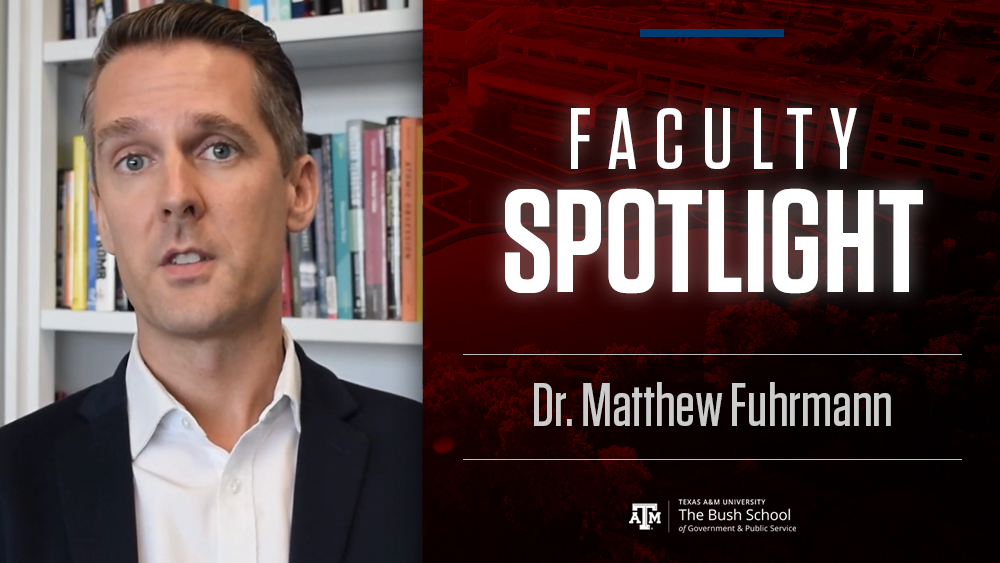
Matthew Fuhrmann is Professor of Political Science at Texas A&M University. His previous positions include Visiting Associate Professor at Stanford University’s Center for International Security and Cooperation (2016-17), Stanton Nuclear Security Fellow at the Council on Foreign Relations (2010-11), and Pre-Doctoral Research Fellow at Harvard University’s Belfer Center for Science and International Affairs (2007-08).
Introduce yourself.
Hi, I’m Matt Fuhrman. I’m a professor in the Department of Political Science here in the Bush School. My teaching and research focuses on International Security and conflict issues, and I also teach classes on nuclear weapons-related issues. I grew up in Buffalo, New York and spent a lot of time in the southeast of the United States. This is my 12th year at Texas A&M and my first year as part of the Bush School, as the Department of Political Science recently joined the Bush School as a third Department.
What research are you currently working on
I’m currently trying to better understand three main topics broadly related to International Security. The first deals with the role of nuclear weapons in world politics, and here, I’m trying to understand how nuclear technology affects peace and stability. I’m finishing up a book right now that examines how having the technological foundations to make a nuclear bomb gives a country potentially greater international influence, while also, under some circumstances, inviting more international conflict against it.
The second main thing that I’m trying to better understand are the role of military alliances for the United States. The United States is in a unique position in that it’s now bound by treaty to defend approximately 70 countries. What I’m trying to understand is what the benefits and the costs are for the United States of putting so many countries under its protection. It turns out that doing this is very costly from a budgetary standpoint, but at the same time, the United States gains a lot in the security realm and the economic context as well, so I’m trying to unpack all of this and better understand the net benefits for the United States.
The third thing I’m trying to better understand is the role that differences among individuals play in international conflict and security, and what I mean by this is: unpacking how differences in the background experiences of individual leaders influences the way that they behave when they’re in office. The main thing that I’m exploring in this context is the role of business experience and especially executive level business experience. Serving as a CEO of a company, for example, and looking at how coming from a business background causes individuals to behave differently than their non-business counterparts if they become head of a government. In prior studies,I’ve shown that leaders from business backgrounds tend to spend less on defense when they have a powerful country like the United States that they can rely on for their security, and I’m now expanding on this work, thinking about how business experience influences whether leaders use military force and also whether they use economic sanctions as tools to try and gain greater influence over other countries.
What do you like about working at Texas A&M?
One thing I love about working here at Texas A&M is, it’s a great environment to pursue answers to the policy problems that I’m really interested in trying to better address, ranging from nuclear war and nuclear weapons proliferation, to questions related to military alliances and the costs and benefits of the United States. I like to bring the tools of modern social science to bear on these really big policy questions facing the United States and the world.
What experience do you have outside of the world of academia?
I went right from being an undergraduate into graduate school, so I didn’t have a full-time job experience in between, but while I was in graduate school I did some contract work for the US government, and also unrelated to what I do now, professionally worked as a bartender and a server in a fine dining restaurant. In addition, I have been visiting fellow at the Council on Foreign Relations in Washington DC.
What accomplishment are you most proud of?
I was named an Andrew Carnegie fellow by the Carnegie Corporation of New York, and this is a program that they have instituted to help people in the humanities and social sciences address really big problems facing our society. Through this Fellowship, I wanted to better understand the role of nuclear technology in international relations, and over the last few years I’ve been working on a big book project that brings together a lot of work I’ve been doing over the last decade looking at how nuclear technology shapes International peace and stability. And it’s been a really challenging project, but a rewarding one now that I’m very close to the end and hoping to wrap it up very soon.
What is your favorite class to teach?
My favorite class that I teach to undergraduates is a course on nuclear politics, and one of the things I really like about this class is, it allows students to better understand what I see as a really pressing issue affecting international peace and stability, but also one that a lot of students coming into college don’t necessarily know a lot about, even though it’s something that we can see about in the news nearly every single day. As far as graduate students go, I really enjoy teaching a class that we call “Research and Writing and Political Science,” which is designed to help our third-year Ph.D. students take a paper from beginning to end, such that by the end of the course they can have a paper completed that could hopefully be sent out for peer review and ideally, ultimately published in a journal, and I find that really rewarding working with our graduate students to improve their research and to ideally get it into shape where it can potentially be published.
